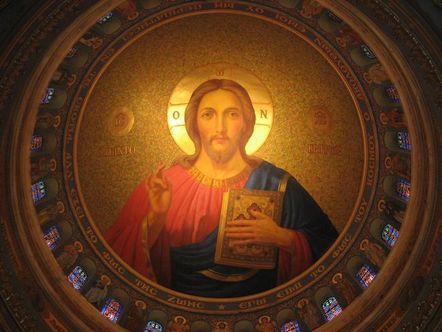 A few weeks ago I went to Los Angeles for my friend Kyle’s wedding. I had a day to see the city, so I did what everyone does when traveling: I explored churches. (I confess that I have some strange ideas about how to have a fun vacation.) My favorite of the places I found was Saint Sophia Cathedral, a majestic Greek Orthodox church. I don’t exaggerate when I say that Saint Sophia is one of the most beautiful places I have ever seen. I was awestruck not just by the cathedral’s beauty but by the presence of Christ there. It was the kind of place you couldn’t just look at; you had to experience it. I stopped and said my midday prayers on the front pew. The grandest feature in the cathedral is the traditional icon in the central dome, the Christos Pantocrator (“Christ Almighty”). One of the ideas behind the image’s placement is that Christ, who rules over all, has gathered his church under him and within his presence. As I left the cathedral and drove around LA that day, I got to thinking about what it means for us as the church to worship in the presence of the Almighty Christ. The idea of the church gathered together beneath Christ stood in contrast with some images I had seen shared on Facebook and elsewhere during the few weeks prior. “Good deeds are not done by walking into a church. They are done when you walk out of the church and help others,” one said. “We aren’t called to fill the pews with members; we are called to fill the world with disciples,” went another. Another read, “The mark of a great church is not how many people come, but how many people live differently for having been there.” I am in sympathy with what I take to be the desire of those messages. We should absolutely be about helping others, about making disciples, and about living differently—precisely because Christ Almighty has offered us new life and promises to the world a new creation. But there was also something in those messages that bothered me—an idea that the real meaning of the church was somehow “out there.” They seemed to suggest that what happens in the church—and worship in particular—is just a means to some other end: doing good in the world, making new disciples, or seeing our lives changed. But we worship not just to be empowered to do good deeds but rather because when we worship, the Triune God is with us. ("Lord, send your Holy Spirit on us gathered here," we pray in the Great Thanksgiving during the Lord’s Supper.) And we worship not just so we can go out and make disciples but because God has made us members of one body together. (“We are all one in Christ Jesus,” we pray at baptisms.) We worship not just so that we may live differently but because God makes us into a new creation in our life together as the church. Worship isn't just a means to an end. It isn't just something to help us go out and do things. It's a new way of being--of being with Christ, of being with each other as the body of Christ, and of being in the world that God created and will redeem. For this reason worship is valuable in its own right. It is not just a means but is itself an end because it is an anticipation of the end we have in Jesus, who reigns over us and makes us his own.
0 Comments
Your comment will be posted after it is approved.
Leave a Reply. |
AboutLet us do life together, growing closer to Jesus, and closer to each other, through stories and experiences from the people of our church. Join us as we begin a new series for the Advent season, beginning Tuesday, November 28. Archives
October 2016
Categories |
Come see us: |

